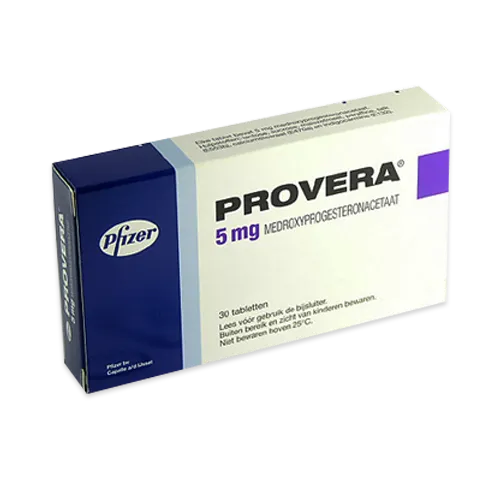Overview
Provera, generically known as medroxyprogesterone acetate, is a synthetic progesterone used to treat hormonal imbalances, including irregular menstrual cycles, abnormal uterine bleeding, and endometrial hyperplasia in postmenopausal women on estrogen therapy. It is also used for endometriosis management and as part of hormone replacement therapy (HRT). Available in 2.5 mg, 5 mg, and 10 mg tablets, Provera offers flexible dosing for tailored treatment.
History of Development and Approval
Developed by Upjohn (now part of Pfizer), Provera was approved by the FDA in 1959 for gynecological conditions. Its long-standing use is supported by extensive clinical research, confirming its efficacy and safety in managing hormonal disorders.
Key Benefits
- Menstrual Regulation: Restores regular menstrual cycles in cases of amenorrhea.
- Bleeding Control: Reduces abnormal uterine bleeding by stabilizing the endometrial lining.
- Endometrial Protection: Prevents hyperplasia in women on estrogen therapy.
- Endometriosis Relief: Alleviates pain and bleeding associated with endometriosis.
Unique Properties
Provera mimics natural progesterone, stabilizing the endometrial lining and regulating hormonal imbalances. Its range of dosages and oral administration allow for personalized treatment, enhancing patient compliance and effectiveness.
Comparison with Similar Medications
Compared to other progestins, Provera offers:
- High Efficacy: Proven effectiveness in diverse gynecological conditions.
- Favorable Tolerability: Fewer side effects compared to some synthetic progestins.
- Flexible Dosing: Multiple tablet strengths for tailored therapy.
Safety and Tolerability
Provera is generally well-tolerated, with common side effects including nausea, breast tenderness, headache, dizziness, and bloating. Rare serious effects, such as blood clots, vision changes, or jaundice, require immediate medical attention. Regular monitoring by a healthcare provider ensures safe use.
Indications for Use
Provera is indicated for:
- Secondary Amenorrhea: Induces menstrual cycles in hormonal imbalances.
- Abnormal Uterine Bleeding: Controls irregular bleeding.
- Endometrial Hyperplasia: Prevents overgrowth in estrogen therapy.
- Endometriosis: Reduces pain and bleeding.
- Hormone Replacement Therapy: Complements estrogen in HRT.
Dosage and Administration
Adults: Amenorrhea: 5–10 mg/day for 5–10 days. Bleeding: 5–10 mg/day for 5–10 days. Hyperplasia: 2.5–10 mg/day for 12–14 days/month. Endometriosis: 10 mg/day for 3 months.
Children: Not indicated.
Elderly: Standard dosing, monitor for tolerability.
Timing: With/without food, consistent schedule.
Notes: Follow prescribed cycle; regular follow-ups required.
Mechanism of Action
Medroxyprogesterone acetate binds to progesterone receptors, stabilizing the endometrial lining, regulating menstrual cycles, and inhibiting endometrial growth to manage hormonal imbalances.
Composition
Active Ingredient: Medroxyprogesterone acetate, mimics progesterone.
Inactive Ingredients: Lactose, microcrystalline cellulose, magnesium stearate for tablet stability.
Side Effects
Common: Nausea, breast tenderness, headache, dizziness, bloating.
Rare: Mood changes, weight gain.
Serious: Blood clots, vision changes, jaundice require urgent care.
Prevention of Side Effects
Use lowest effective dose, monitor for serious symptoms, maintain regular check-ups. Report unusual symptoms promptly to healthcare provider.
Contraindications
Avoid in hypersensitivity to medroxyprogesterone, hormone-sensitive cancers, active liver disease, or history of thromboembolism.
Warnings and Precautions
Monitor for cardiovascular risks, liver function, or mood changes. Caution in patients with history of depression, liver disease, or clotting disorders.
Drug Interactions
CYP3A4 inducers (e.g., rifampin) reduce efficacy; aminoglutethimide decreases levels. Disclose all medications to provider.
Overdose
Symptoms: nausea, vomiting, vaginal bleeding. Seek emergency care immediately.
Pharmacokinetics
Absorption: Well-absorbed, peak 2–4 hours.
Distribution: Highly protein-bound.
Metabolism: Liver via CYP3A4.
Elimination: Urine; half-life 12–17 hours.
Dosage Forms
Tablets (2.5 mg, 5 mg, 10 mg) for oral administration.
Pregnancy and Breastfeeding
Contraindicated in pregnancy (Category X); avoid breastfeeding due to potential risks.
Storage
Store at 20°C–25°C (68°F–77°F), dry, light-protected, away from children. Dispose expired properly.
Clinical Evidence
Trials confirm Provera’s efficacy in regulating menstrual cycles, reducing abnormal bleeding, preventing endometrial hyperplasia, and managing endometriosis symptoms with high reliability.
Conclusion
Provera is a versatile and effective progestin for managing hormonal imbalances and gynecological conditions. Adhere to prescribed regimens, monitor side effects, and consult providers for optimal outcomes.




